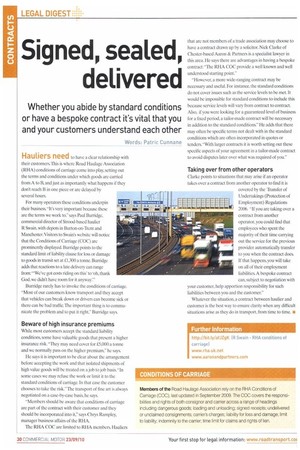Signed, seated, delivered
Page 30

If you've noticed an error in this article please click here to report it so we can fix it.
Whether you abide by standard conditions or have a bespoke contract it's vital that you and your customers understand each other
Words: Patric Cunnane
Hauliers need to have a clear relationship with their customers.This is where Road Haulage Association (RHA) conditions of carriage come into play, setting out the terms and conditions under which goods are carried from A to B, and just as importantly what happens if they don't reach B in one piece or are delayed by several hours.
For many operators these conditions underpin their business "It's very important because these are the terms we work to," says Paul Burridge. commercial director of Strood-based haulier R Swain, with depots in Burton-on-Trent and Manchester.Visitors to Swains website will notice that the Conditions of Carriage (COC) are prominently displayed. Butridge points to the standard limit of liability clause for loss or damage to goods in transit set at £1,300 a tonne. Burridge adds that reactions to a late delivery can range from: "'We've got costs riding on this' to 'oh, thank God, we didn't have room for it anyway" Burridge rarely has to invoke the conditions of carriage.
"Most of our customers know transport and they accept that vehicles can break down or drivers can become sick or there can be bad traffic. The important thing is to conunu nicate the problem and to put it right," Burridge says.
Beware of high insurance premiums
While most customers accept the standard liability conditions, some have valuable goods that present a higher insurance risk. "They may need cover for £5,000 a tonne and we normally pass on the higher premium," he says.
He says it is important to be clear about the arrangement before accepting the work and that isolated shipments of high value goods will be treated on a job to job basis "In some cases we may refuse the work or limit it to the standard conditions of carriage. In that case the customer chooses to take the risk."The transport of fine art is always negotiated on a case-by-case basis, he says.
"Members should be aware that conditions of carriage are part of the contract with their customer and they should be incorporated into it," says Chrys Rarnpley, manager business affairs of the RHA.
The RHA COC are limited to RHA members Hauliers that are not members of a trade association may choose to have a contract drawn up by a solicitor. Nick Clarke of Chester-based Aaron & Partners is a specialist lawyer in this area. He says there are advantages in having a bespoke contract: "The RHA COC provide a well known and well understood starting point."
"However, a more wide-ranging contract may be necessary and useful. For instance, the standard conditions do not cover issues such as the service levels to be met. It would be impossible for standard conditions to include this because service levels will vary from contract to contract. Also, if you were looking for a guaranteed level of business for a fixed period, a tailor-made contract will be necessary in addition to the standard conditions" He adds that there may often be specific terms not dealt with in the standard conditions which are often incorporated in quotes or tendets."With larger contracts it is worth setting out these specific aspects of your agreement in a tailor-made contract to avoid disputes later over what was required of you."
Taking over from other operators
Clarke points to situations that may arise if an operator takes over a contract from another operator to find it is covered by the Transfer of Undertakings (Protection of Employment) Regulations 2006. "If you are taking over a contract from another operator, you could find that employees who spent the majority of their time carrying out the service for the previous provider automatically transfer to you when the contract does If that happens, you will take on all of their employment liabilities A bespoke contract can, subject to negotiation with your customer, help apportion responsibility for such liabilities between you and the customer."
Whatever the situation, a contract between haulier and customer is the best way to ensure clarity when any difficult situations arise as they do in transport, from time to time. •
































































































































